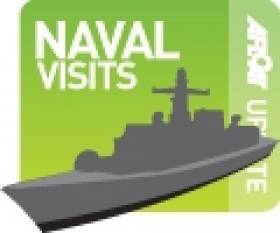Displaying items by tag: Cork Rebel Week
Cork Rebel Week 'Gathers' International Navies
#VisitingNAVIES – More foreign navies continued to gather in Cork Harbour yesterday afternoon to form part of the Cork Gathering Rebel Week which ends tomorrow, writes Jehan Ashmore.
Among the participants of the International Naval Festival are navies from Belgium, France, UK and the Russian Federation which took part in a Fleet Review starting in lower Cork Harbour to Cork City quays. The naval procession was led by the Naval Service flagship L.E. Eithne (P31) which departed Cobh with Minister of Defence Alan Shatter T.D.
His cabinet colleague Minister for Agriculture, Food and the Marine, Simon Coveney had arrived late at the quayside as the L.E. Eithne had to depart on time to lead the review. This resulted in the minister having to hitch a lift from a Port of Cork Company pilot cutter that caught up with the flagship so to enable a transfer onboard.
The naval visitors are docked in Cork City Quays were they will be open free of charge today and tomorrow. So here's a great chance see the array of naval ships and meet the crews.
It would be advisable to confirm the latest updates regarding access to the the naval ships and times (as not all vessels may be open) by visiting: www.corkrebelweek2013.com/
Also taking part in the naval festival albeit moored at the deepwater quay in Cobh is the impressive Russian Navy corvette the RFS Soobrazitelny (531) which only entered service in recent years.
A spectacular Evening Colour Ceremony performed by naval crews in Cork City quays is scheduled for tomorrow (Sunday) at 6:30pm.






























































